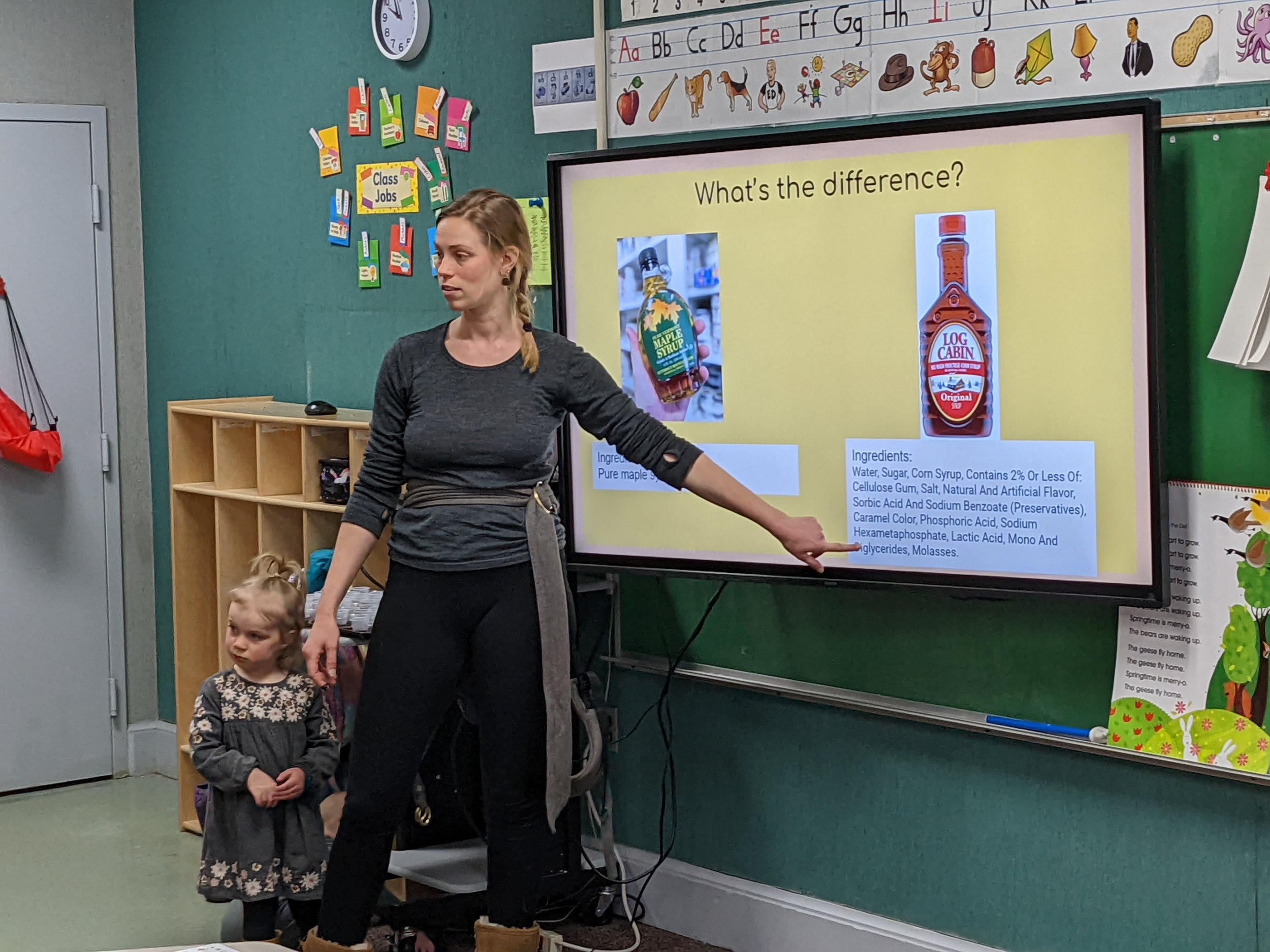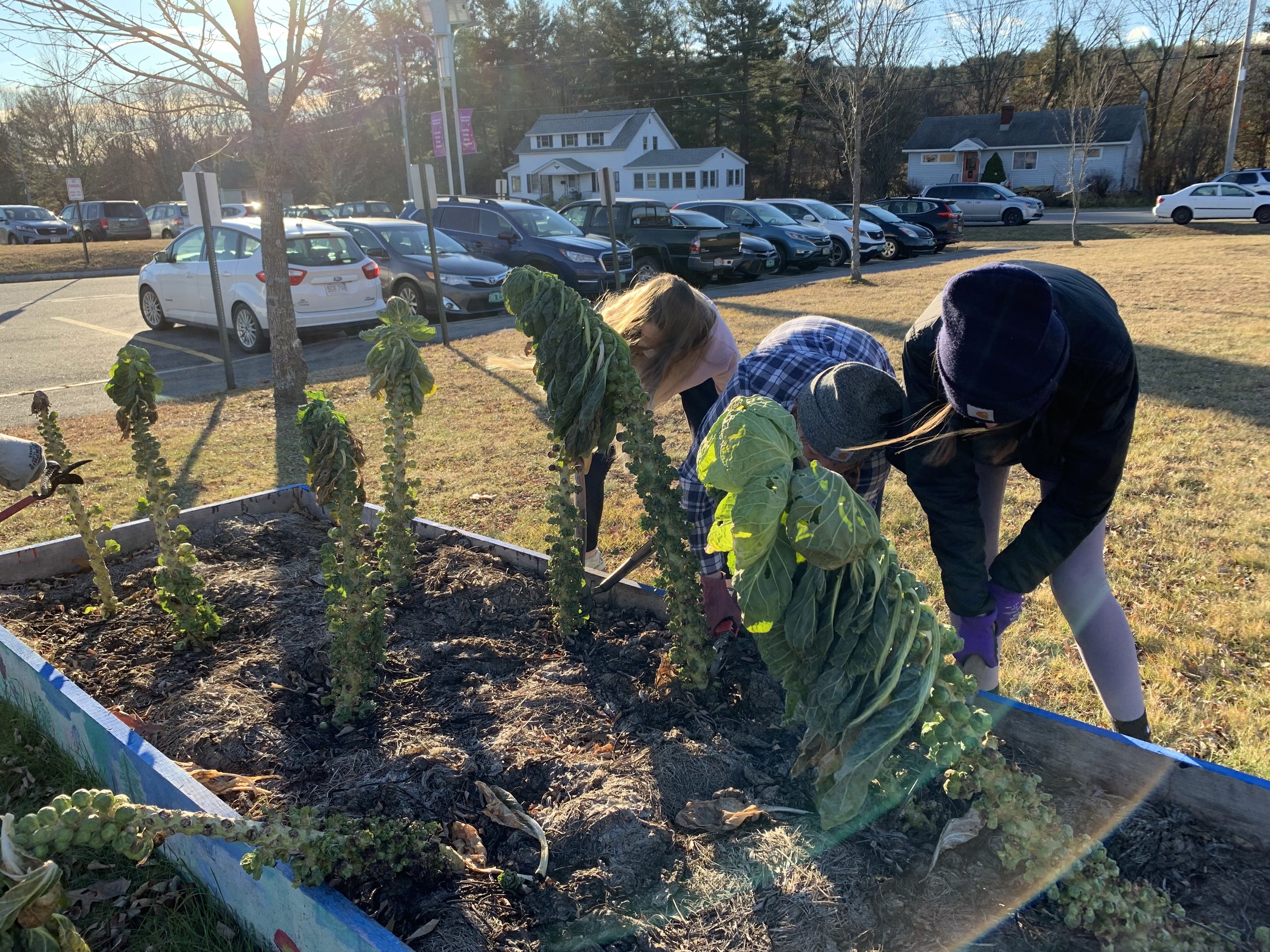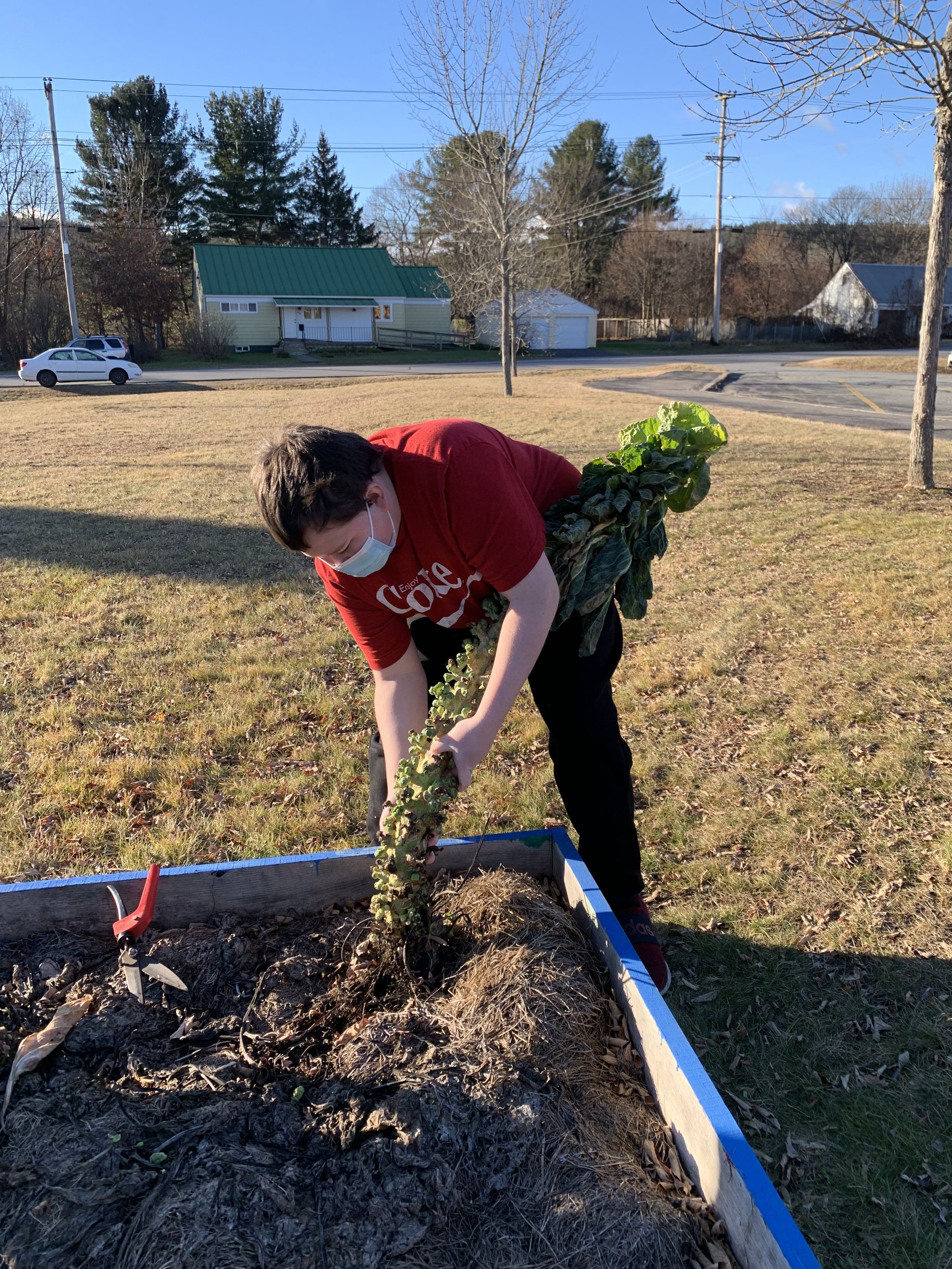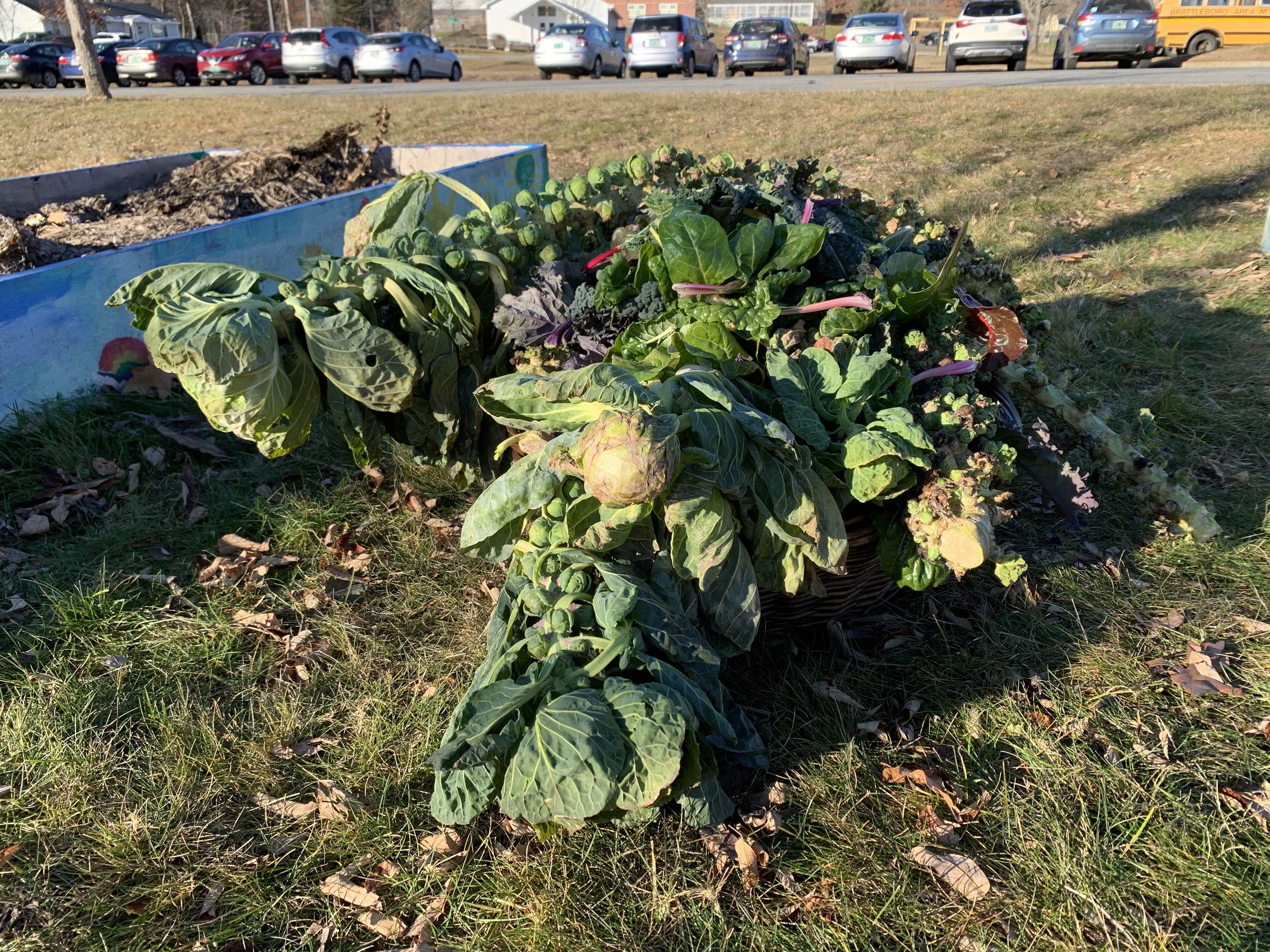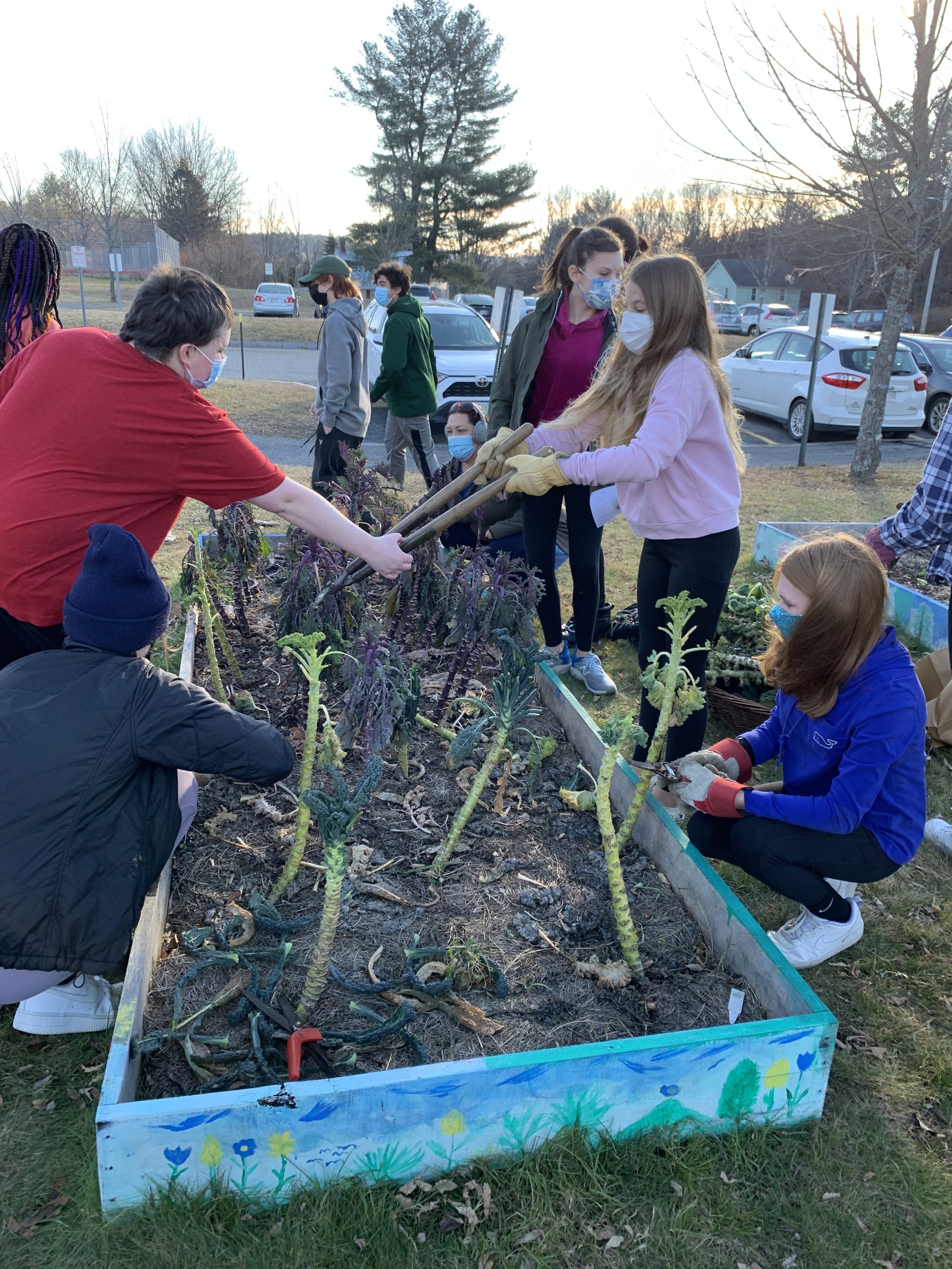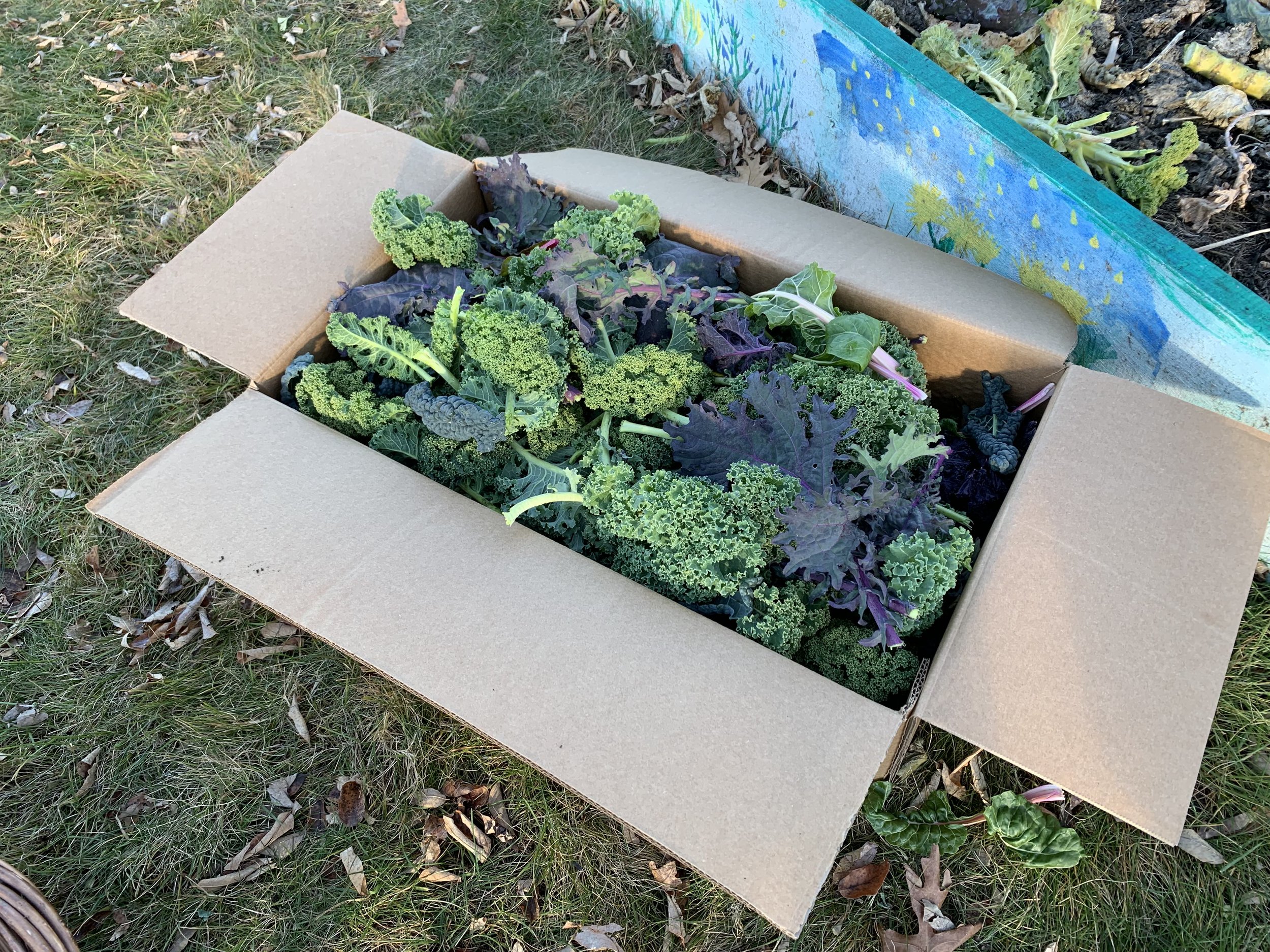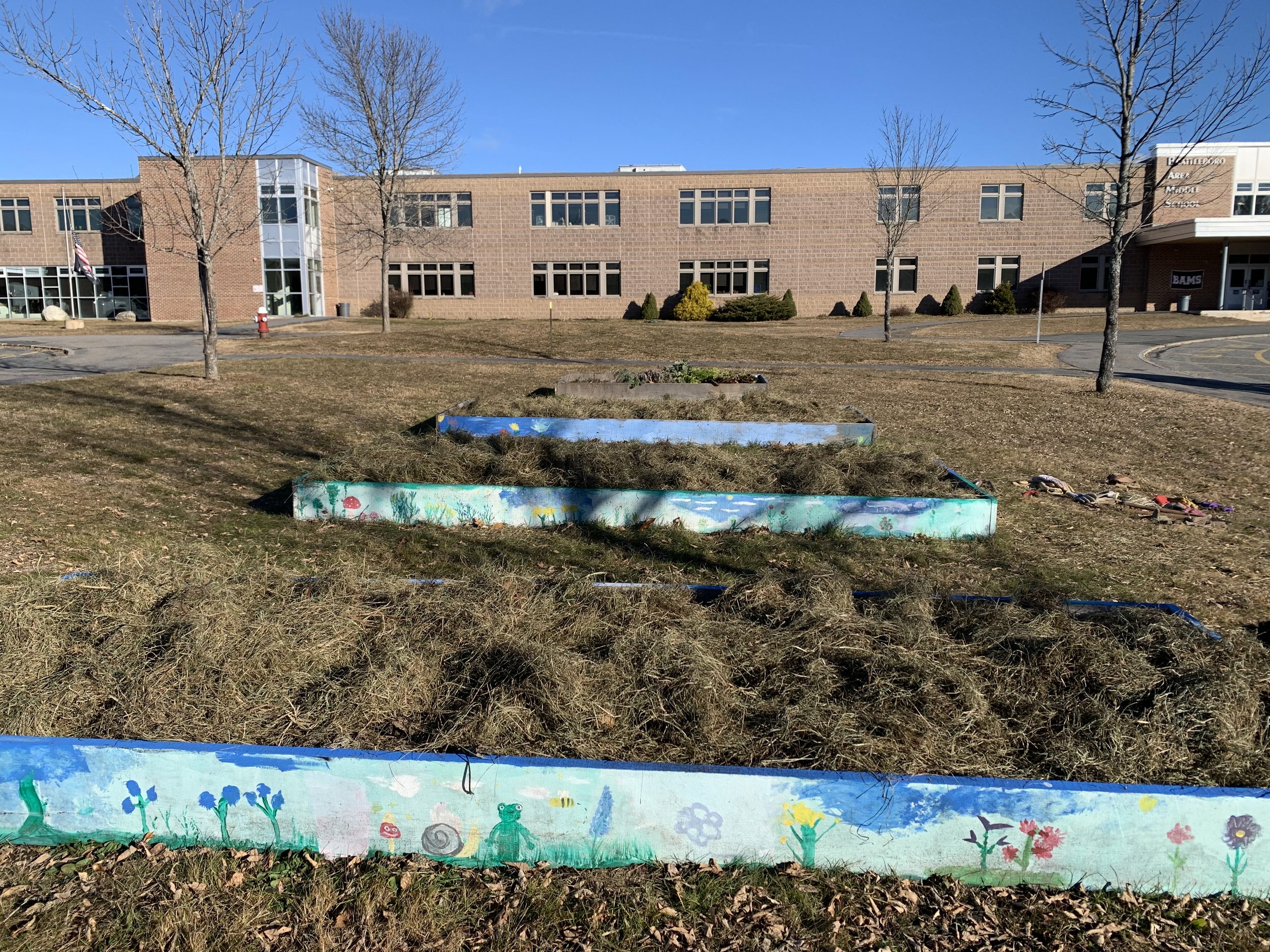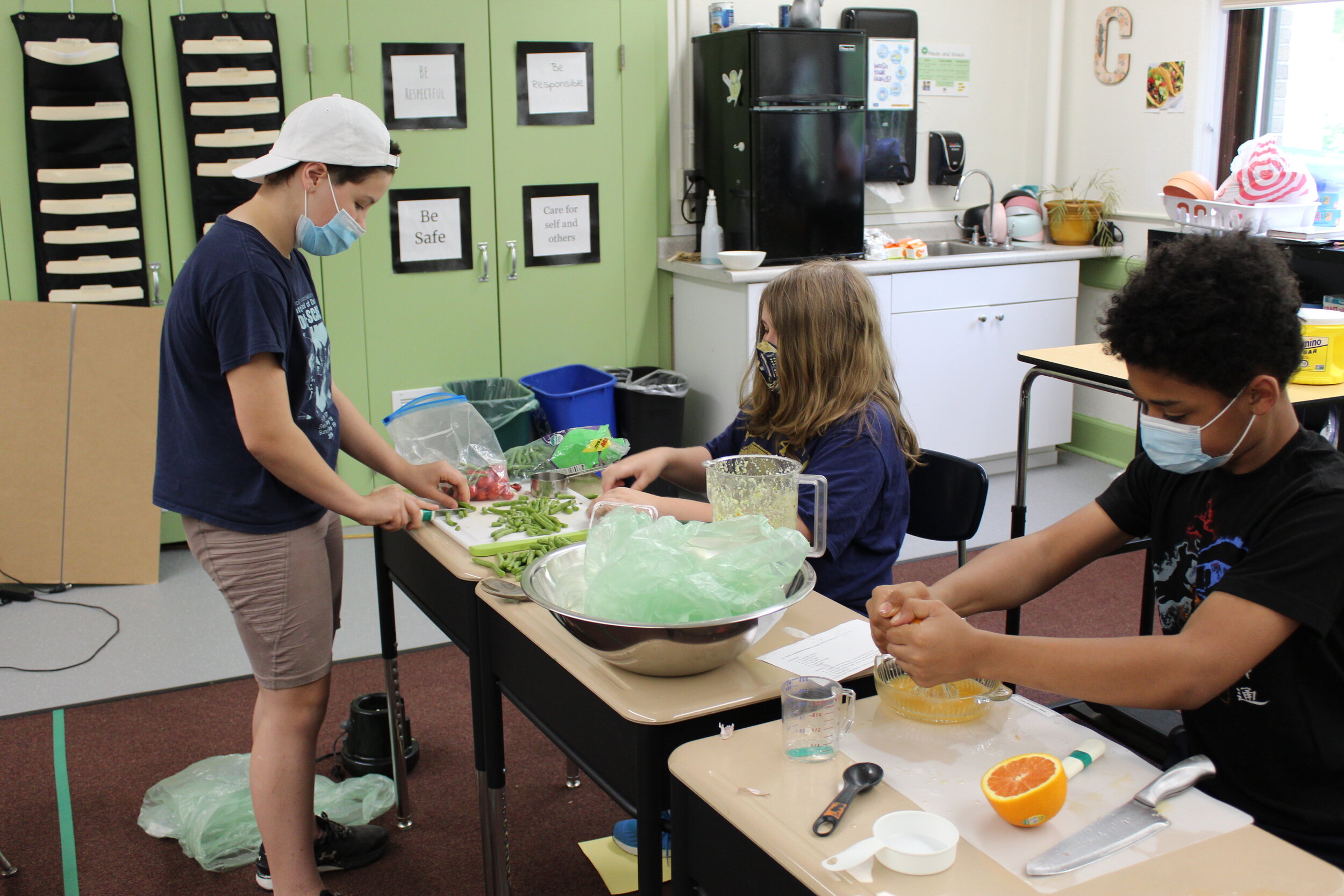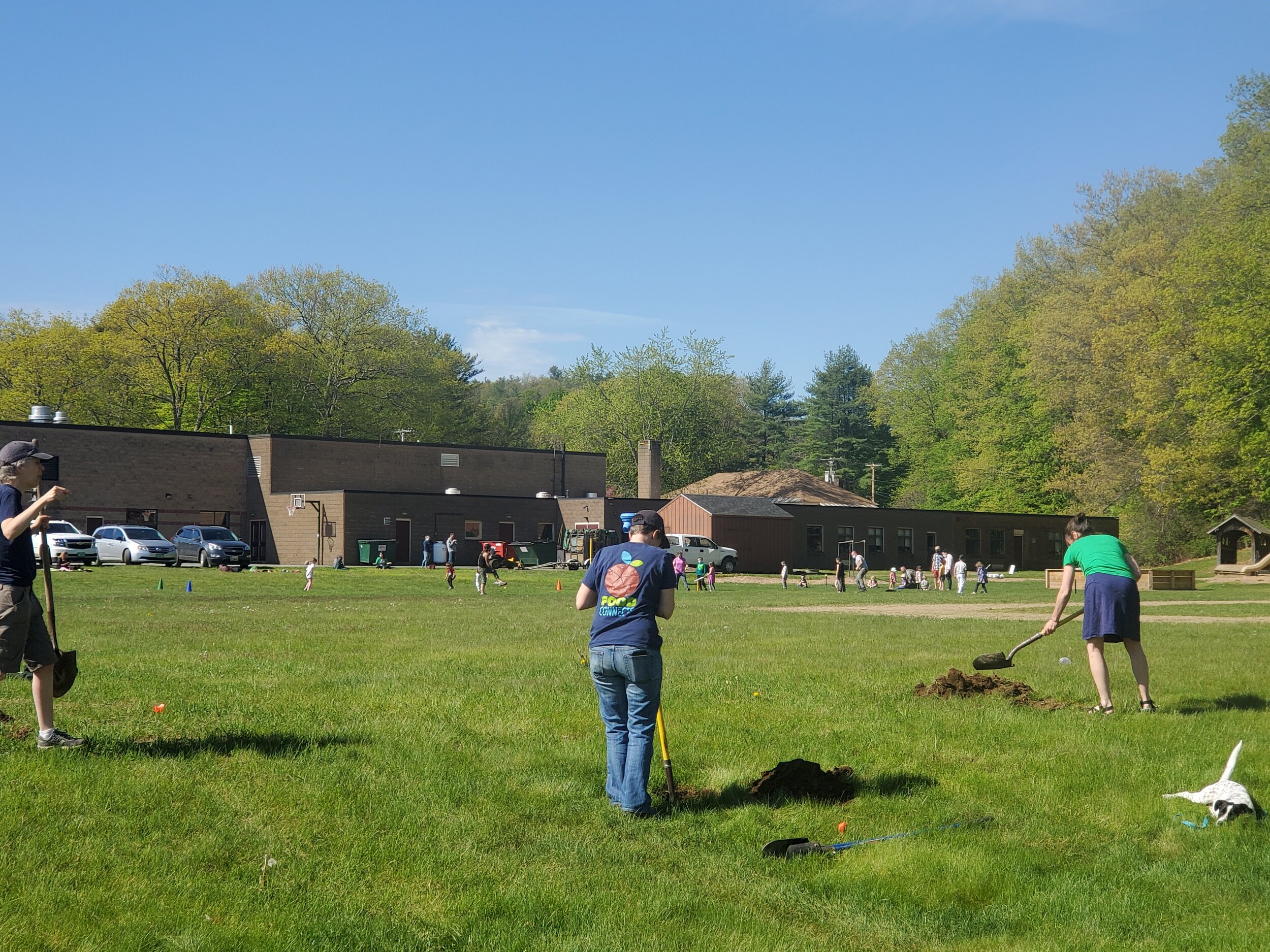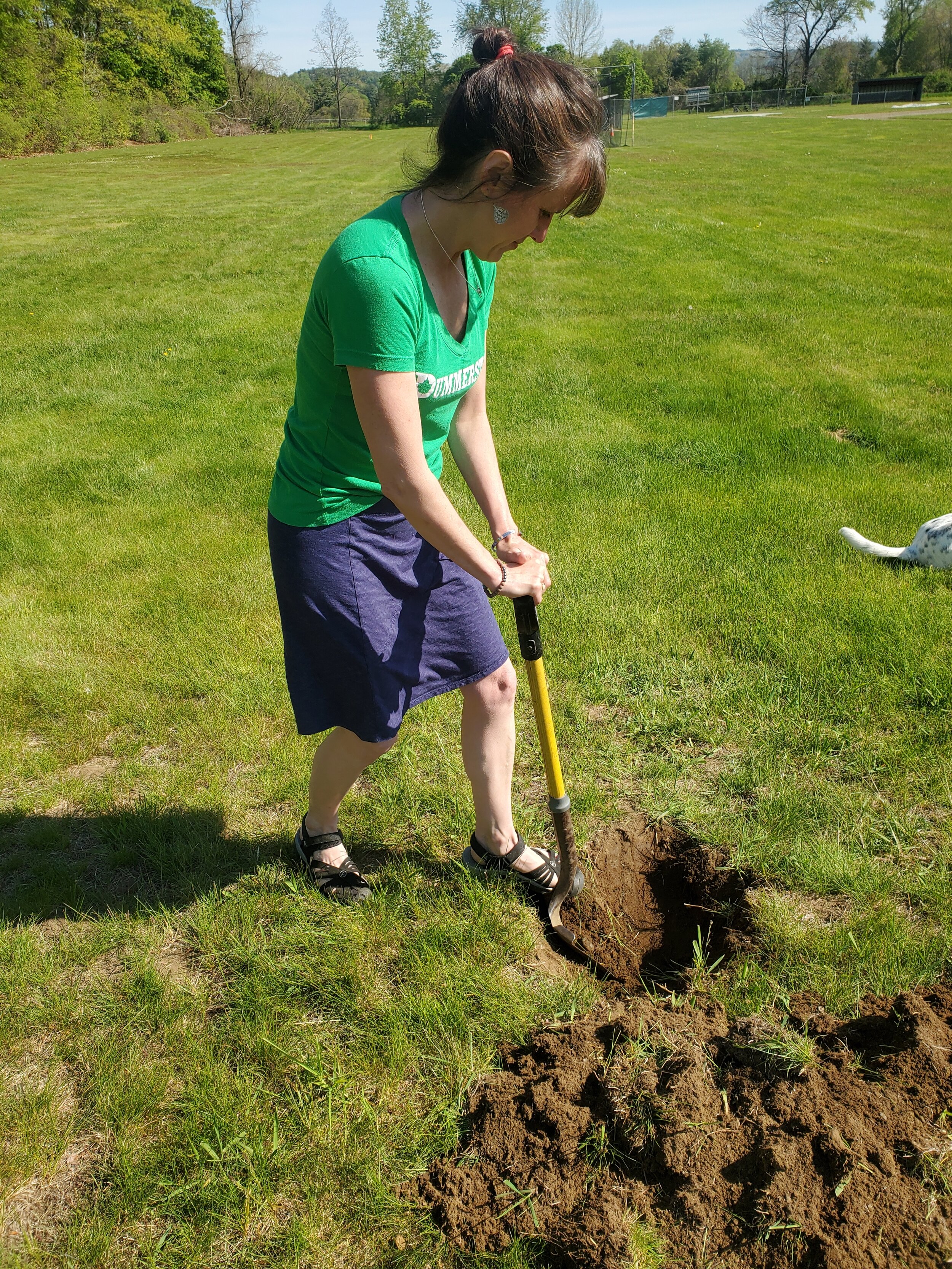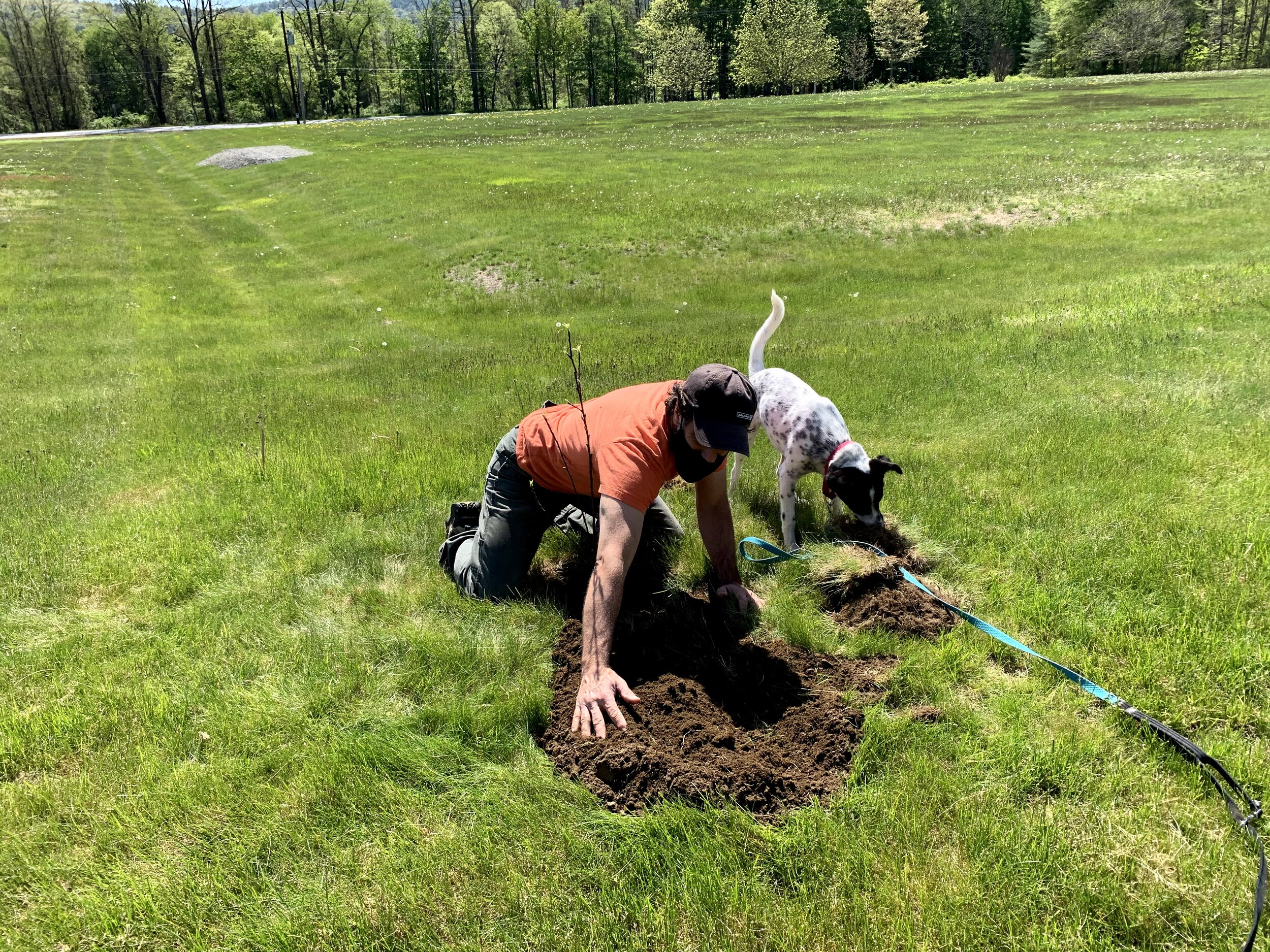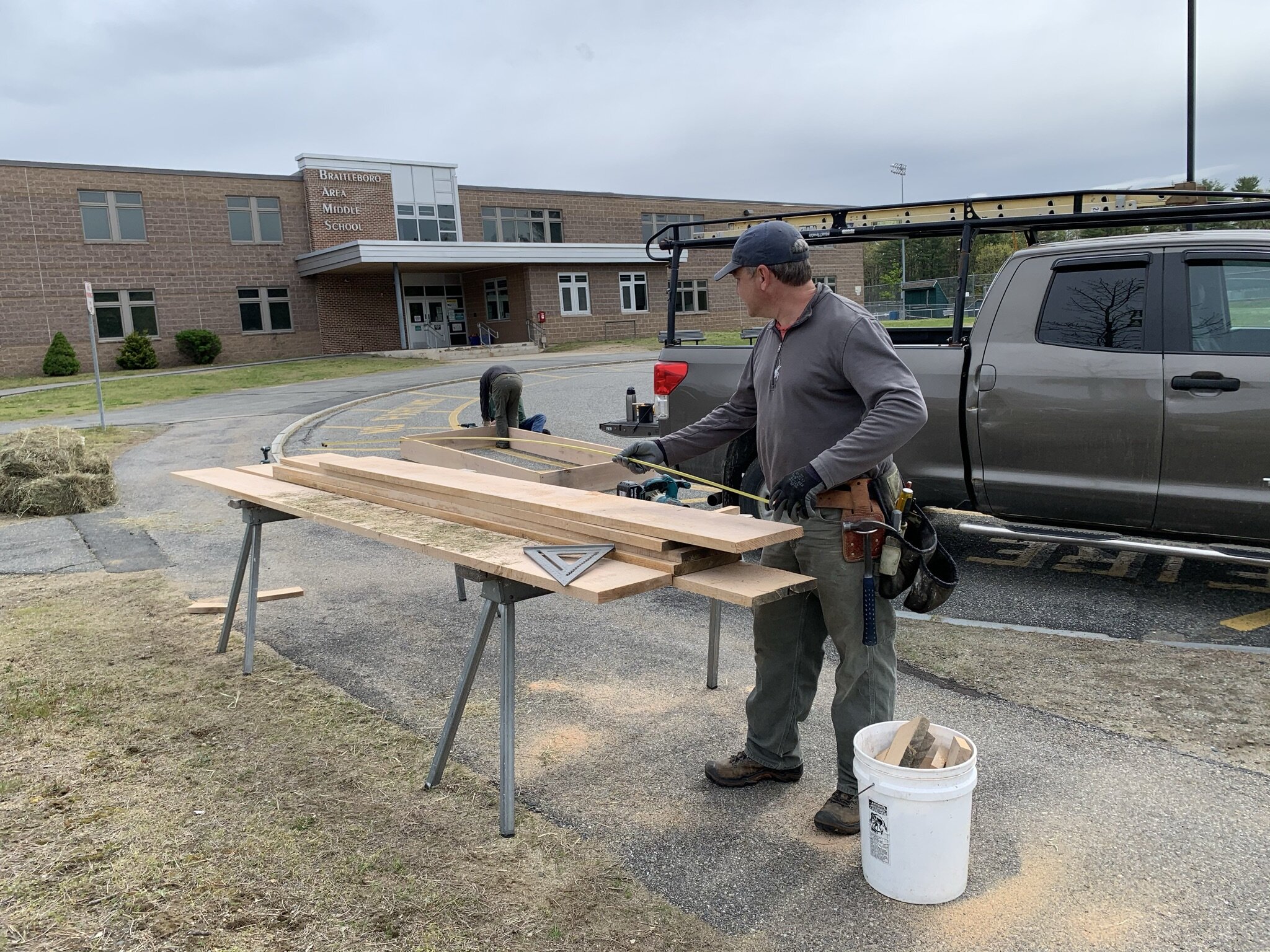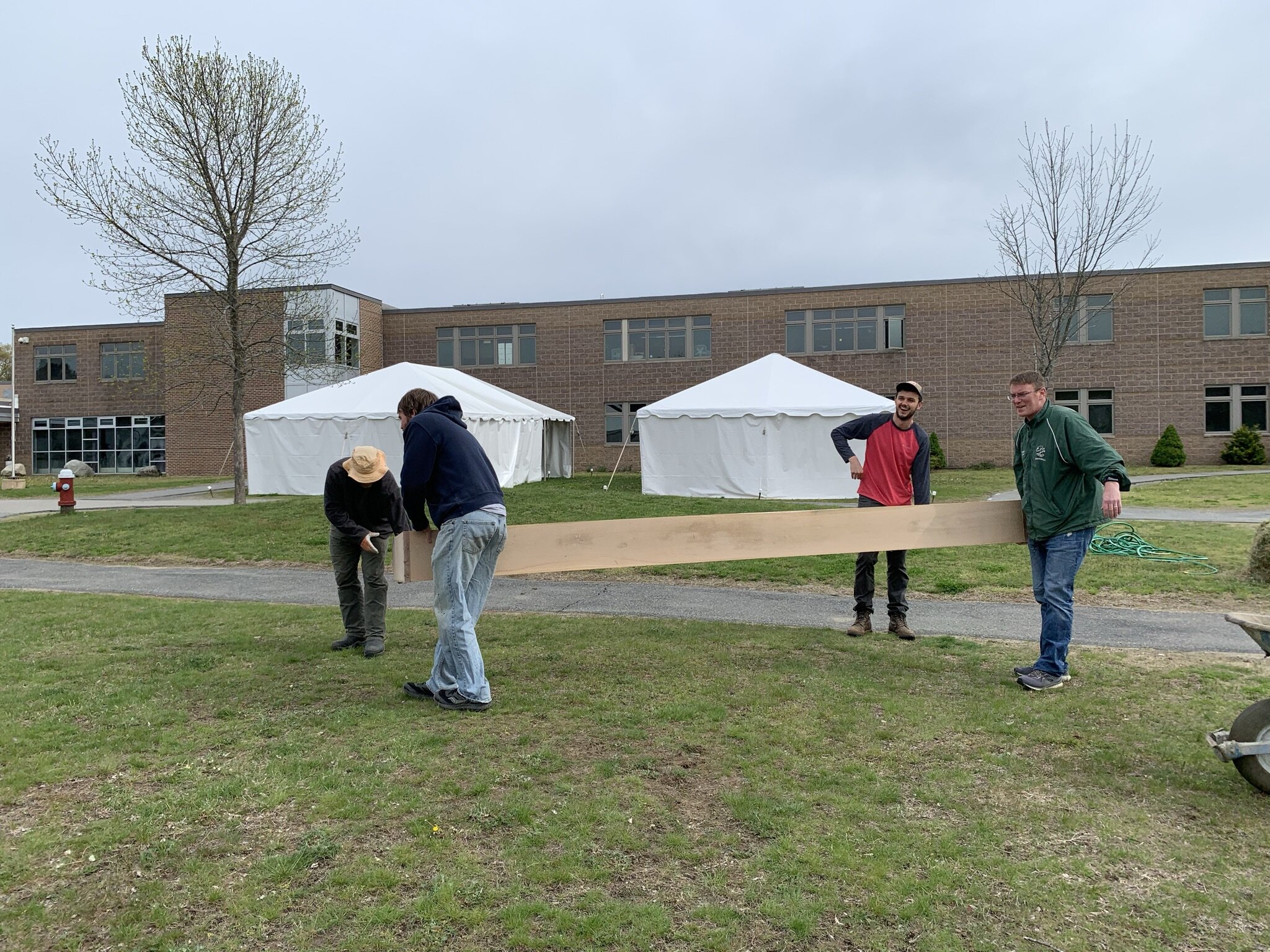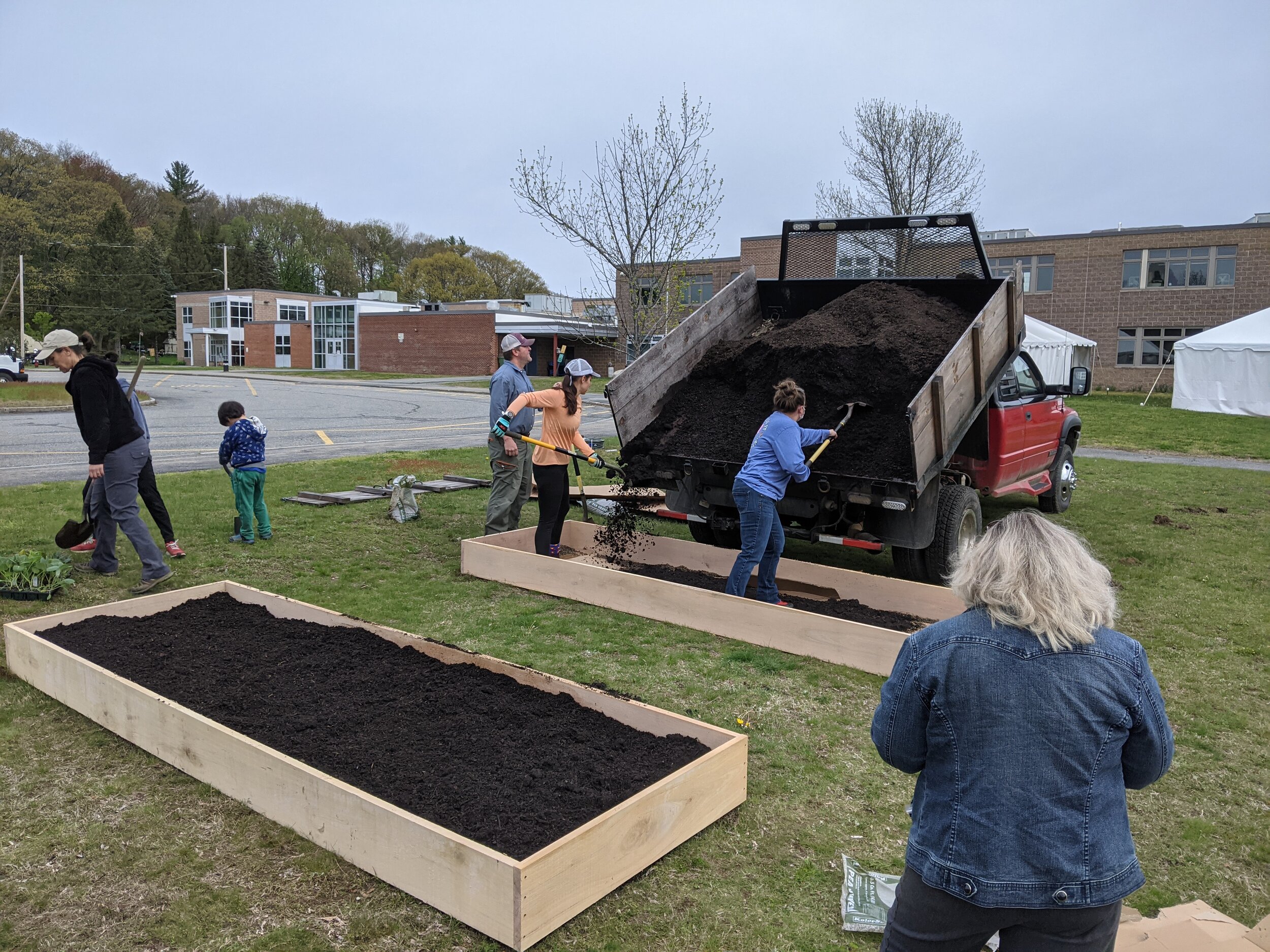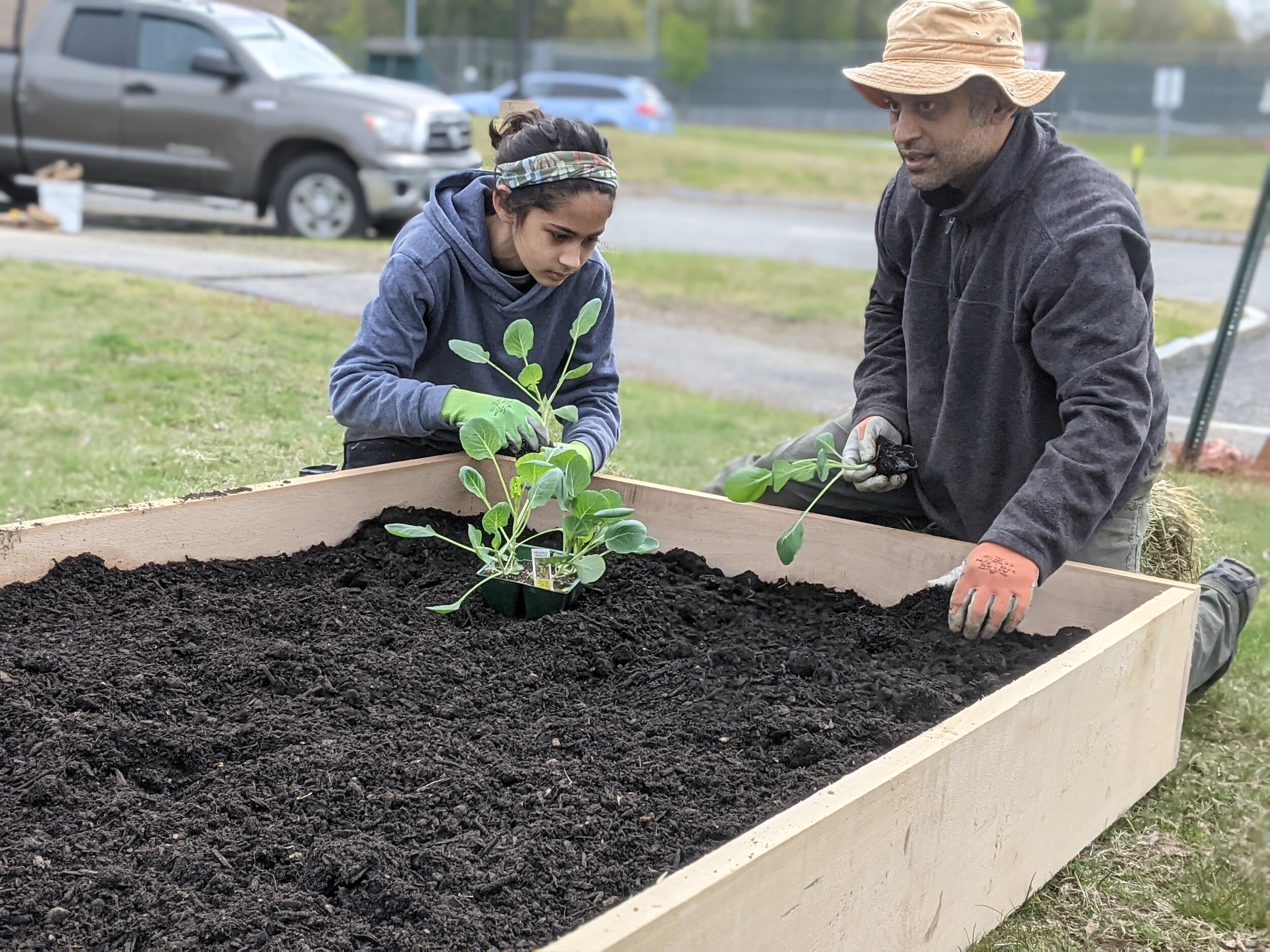Second graders from Academy School got to share their scratch cooking skills by making beautiful chocolate beet cupcakes, topped with pink frosting tinted with beet juice, for a recent Windham Southeast School District (WSESD) school board meeting. This delicious treat was just the beginning of a very special Valentine’s Day evening presentation celebrating school gardens, Farm to School programs, and outdoor education in WSESD schools.
Blue Cross and Blue Shield Mini-Grants Support FTS Programming in Area Schools
Several area schools, including Academy School, Towsend Elementary, and Newbrook Elementary, were awarded grants by the Windham County Community Advisory Board of Blue Cross and Blue Shield of Vermont. This is a volunteer board of dedicated Windham County residents who are local champions of healthy activity and programming of all kinds. Several proposals were submitted for this round of funding to strengthen Farm to School (FTS) programming, and Food Connects is thrilled to celebrate this vital support for FTS-related wellness projects in some of our member schools!
At Academy School, 4th-6th grade classes are excited to receive funding to purchase a grow lab and humidity tent that they will use to grow plants for their garden beds. The grow lab will provide approximately 180 students the opportunity to become more involved in starting seeds in their classrooms. The seedlings grown will stock their school garden beds with vegetables, herbs, and flowers that can be used for cooking activities in their classrooms.
Townshend Elementary School launched a brand new FTS program in March. This grant will provide vital funding for purchasing ingredients and materials for Harvest of the Month taste tests and seed money for starting a small garden at the school. Taste tests are being given in each school classroom, reaching all 110 students. Students enjoyed the first Harvest of the Month activity in March, which focused on maple syrup. Teachers have already utilized funds from the grant to purchase a variety of whole grains for students to see, touch, and make art with, as well as some whole-grain bread and plain, refined flour white bread for April’s taste test. Garden planning is underway!
Just down the road at Newbrook Elementary School, the grant will fund multiple FTS-related projects. A woodfired pizza oven is central to Newbrook’s school culture and FTS program. This grant will fund the purchase of firewood to fuel the oven for six months and ingredients for pizza dough and sauce. The FTS team is also building two new raised beds next to the pizza oven so that students will be able to enjoy or work in the garden during recess time, if they choose, and will be able to harvest herbs and pizza toppings moments before their pie goes in the oven! The remainder of the grant will be used to restock the school’s cooking cart so that Amy Duffy, the school’s Garden Coordinator and FTS Educator, can continue to cook with students during her weekly visits to each classroom.
Many thanks to the Windham County Community Advisory Board of Blue Cross and Blue Shield of Vermont for supplying these grants and providing essential funding for activities and green spaces at our local schools.
First Garden Harvest at BAMS!
On a chilly morning in early December, Food Connects staff joined a group of approximately 15 students and Brattleboro Area Middle School (BAMS) teacher Mandy Nash for the final garden harvest and to put the school garden to rest for the winter. These new garden beds, built in the spring of 2021, finished the season strong! They were a source of fresh herbs for the school cafeteria throughout the summer and fall. This final harvest included Brussels sprouts, kale, and swiss chard. Food Service Director and chef Ali West of Fresh Picks Cafe was eager to transform the produce into a harvest salad for BAMS students to enjoy in the school cafeteria at lunchtime.
Students rose to the challenge of using big loppers to chop through the thick stems of the brussels sprouts, and several students were very curious to see the tiny aphids who had infested several kale leaves. At the end of the harvest, the last step was covering the beds in local mulch hay donated by a BAMS family from Guilford.
Getting outside and doing hands-on garden work can be a rarity during the busy academic school day, and Food Connects was happy to provide the tools, resources, and support to help make this first harvest a success. BAMS is already thinking about spring planting in a few short months, and Ali West has requested more fresh herbs for her kitchen!
Westminster Center School Celebrates Farm and Field Day
Stuffing scarecrows, painting pumpkins, cooking lunch over hot coals, and playing musical chairs… These are not your everyday school activities. But this is how the students at Westminster Center School spent the morning of October 29, when they celebrated their first Farm and Field Day.
Students from grades K-6 took part in six different activities crafted to link students to the outdoors and celebrate the harvest season. In addition to the excitement of scarecrows, pumpkins, and musical chairs (renamed “Boo-tiful Music!” in honor of the holiday), students went on a story walk, harvested kale from the garden for lunch, watched working farm equipment in action, and watched as the chicken for their kale salad cooked over coals in the outdoor cinder block kitchen, the “Cinder Cafe,” built especially for this event.
Despite the frigid temperatures, students were excited to be outside. “The best part is you get to have fresh air!” remarked Scarlett, a second-grader. “I’m having fun! It’s very fun!” exclaimed first-grader Anthony Lakeside. And fourth-grader Jenny said her favorite activity of the day was harvesting kale. “You get to peel all the leaves off!”
The librarian and Garden Coordinator, Mandy Walsh, said she was inspired by a similar event at Newbrook Elementary several years ago. Mandy has been growing the Farm to School program at Westminster for years and was excited to host her first Farm and Field Day. “We are so lucky to have the resources of gardens, animals, woods, and fields, and we live in a historically agricultural community. The day was about celebrating what's around us, coming together as a school community, and being joyful.” In reflecting on the success of the event, Mandy remarked, “I think that in the big picture, the best student learning happens when students get to be outside, working together, trying new things (food and activities). These are the days our students remember with fondness when they think back on their elementary school days.”
The Farm to School Team at Westminster is already planning future events and is flush with ideas of building on the tradition they’ve started. One thought was that perhaps next year, the sixth-graders could lead the stations rather than the teachers. Cheers to Westminster Center School for growing and cultivating leaders in the Farm to School Movement!
Cross-Pollination Gathering for School Garden Coordinators
Sarah Rosow searches for a cukamelon in the students snacking garden.
Garden Coordinators from five Windham County Farm to School programs gathered at Guilford Central School for a “Cross-Pollination” event in late October. Garden Coordinators, often somewhat isolated in their unique roles, had the opportunity to share ideas, challenges, and successes with each other as they prepare for winter activities in the classroom.
More and more area schools have hired Garden Coordinators in recent years, finding that they are a key component to a thriving Farm To School program. In addition to taking care of the gardens with support from students and volunteers, they also plan and execute educational activities around gardening and cooking and facilitate teacher and student involvement in FTS programming.
Sarah Rosow explains to Mandy Walsh how the Kelly Kettle works—a wonderful tool for making tea in the garden!
Sarah Rosow, Guilford’s Garden Coordinator since 2018, hosted the event, showing the visitors the school’s three different garden areas, the outdoor classrooms, and concluding with a “show and tell” of sorts where Coordinators discussed useful equipment for cooking outdoors, curriculum guides, and sample lessons. Everyone was inspired by Sarah’s “snacking garden” where students are able to snack freely on mint, cherry tomatoes, and adorable cukamelons growing on her archway.
As they toured the campus, Garden Coordinators discussed their roles at their schools and what makes their programs unique. While Guilford’s program excels at innovative outdoor teaching, Mandy Walsh of Westminster Center School offered the details of her upcoming Farm and Field Day—an event 3 years in the making, where students will participate in six different Farm to School stations. Kathy Cassin of Academy School spoke about her after-school cooking and gardening club while also gathering ideas about deterring the deer that had been eating all of Academy’s beautiful greens. After hearing that Mandy had some success with growing a border wall, she remarked, “that's good to know because it’s been so frustrating losing our greens!”
Sarah Rosow demonstrates using a pull chopper, which she uses to make fresh salsa and pesto in the garden.
Erica Frank of Central Elementary, a registered dietician and current Food Service Professional at the school, spoke about the value of getting kids involved in cooking. Amy Duffy, the new Garden Coordinator at Newbrook Elementary, agreed. “Giving kids a little more control over their eating then leads to better choices.” Amy also shared that she works with each grade once per week. Sarah Rosow responded, “I’d like to pick Amy's brain a little more in terms of the scope and sequence, and also just learning how she works in every grade level every week and how she manages that because I’d like to move toward that model.”
Everyone gained new ideas from this gathering, and it was clear at the end of the event that everyone had so much more expertise to share and so many more questions to discuss. In response, Food Connects looks forward to hosting more Cross-Pollination for Garden Coordinator events for our member schools throughout this school year.
BS&L Grows Farm to School in Brattleboro
Sprouting kits, blooming gardens, outdoor exploration, and more—Brattleboro schools had a great year of Farm to School activities. Over the past school year, we have seen the flexibility and adaptability of Farm to School programs. At Food Connects, we work with schools to coach teams and implement Farm to School activities. This year, Brattleboro Savings & Loan (BS&L) sponsored a portion of our work in the Brattleboro schools.
"At BS&L, we understand that good nutrition and access to healthy foods is critical to developing lifelong healthy eating habits and overall good health,” says Dan Yates, President and CEO at BS&L. “That's one reason we support this important program."
Students gardening at Green Street School.
One of the most effective ways to get kids to eat new foods is by engaging them in growing their fruits and veggies. Taste tests and school gardens throughout the Windham Southeast School District (WSESD) bring these experiences daily. The Farm to School efforts don’t end when the school year finishes either! A perennial Farm to School question is, what do you do with the gardens when students aren’t there? Each school has a unique answer to this question; the WSESD partners with Food Connects to ensure the gardens thrive throughout the year.
Tara Gordon, Food Connects Garden Coordinator, has worked hard all summer tending to the plants and inviting families into the space. Tara’s consistent presence ensures the beds don’t get out of hand, whether it’s an early-season drought or soaking rains. She is also a friendly guide for families interested in learning more over the summer months.
“It's amazing to see the gardens come to life in the summer, the colors, the smells, the heights and fullness of the plants, and of course the fresh fruits and vegetables we can enjoy, making the garden such a wonderful place to spend time in the summer.” reflects Mary Kauffman, Oak Grove School Principal. “Each month, Tara can be seen throughout the school working with classes, both inside and outside, to learn more about gardening, harvesting, and cooking!”
Summer Garden Coordinator, Tara Gordon.
Support from Brattleboro Savings & Loan helps Food Connects bring the needed resources to Tara and Oak Grove for successful programs, whether that’s cooking supplies, seeds, community connections, or a partner in curriculum development. Visit Oak Grove during their annual Harvest Dinner to see the fruits of everyone’s work—delicious foods grown on the campus and engaged students proud of the healthy meal they had a part in creating.
For many, Farm to School is the highlight of the day, principals included! “I love spending time in classes when Tara is the guest visitor,” says Mary Kauffman. “We get to learn about the harvest, see how easily it can be included in our everyday lives, and get to taste something delicious.”
The Farm to School Year in Review
Mixing bowls full of tropical fruits and veggies, hot plates frying up potatoes, and new foods abound (think tamarind, hibiscus, and cassava). This past June, Green Street School’s sixth-grade French class prepped mango and avocado salad from Seychelles alongside a hearty Haitian riz colle, in addition to 9 other dishes and drinks to celebrate six years of learning about French language and culture.
Back in October of 2020, this would have seemed impossible. Thanks to dedicated educators throughout the region and Food Connects support, Farm to School scenes like this cooking experience continued throughout the year and helped provide normalcy to an otherwise challenging year.
Many educators saw Farm to School as a means to get students out of the classroom. “Gardening time was an absolute highlight of the day for me and my students,” reflected Molly Stoner, a 4th-grade teacher at Dummerston School. “Students would run out and check for sprouting/growth in their milk jug greenhouses the second they got to school. Later in the spring, adding compost to beds, planting and watering the seed they sown, taking home sprouts enriched us all and kept us grounded in all the potential of our beautiful Vermont land."
This spring, Dummerston planted 12 apple trees donated by Scott Farm Orchard. Many other school gardens expanded as well. For example, Grafton Elementary School added a pumpkin patch to their school garden. Central Elementary School in Bellows Falls expanded its urban growing space and plans to develop a more robust Farm to School program that emphasizes community connections.
For those feeding our students, the year never let up. Born out of the pandemic, our Who Feeds Our Kids series celebrated the school nutrition professionals who remain the backbone of the school community. Responding to rising food insecurity, they sent out weekend and school break food boxes. With local food from the Food Connects Food Hub highlighted, the food boxes provided another layer of support for families experiencing food insecurity. We’re excited to see the expanded service stay for years to come.
Food Connects’ flexible support helped schools maintain their programs and respond quickly to new obstacles; when our network schools couldn’t find COVID-19 cooking guidelines, we researched CDC recommendations to create a protocol for educators to follow. We put together 800 sprouting kits for students during the doldrums of late winter, adding some greenery to classrooms and anticipation for more planting come spring.
“It’s the creativity and flexibility that we saw throughout the pandemic that is going to help us spring forward next year,” says Conor Floyd, Food Connects Farm to School Program Manager. “We’re excited to continue working alongside our school partners to develop new programming opportunities.”
Guilford Farm to School Thrives on Community Partnership
What does it take to make a successful Farm to School program? At Guilford Central School (GCS), a big part of the answer is community partners.
Kindergarteners Jared and Jimmy plant a peach tree near the K/1 outdoor classroom.
“The community support that we see at Guilford Central School is amazing. From the dedicated parents on the Leadership Council to parents who donate mulch for our blueberry plants and excavator time to site a shed, it’s really inspiring to see. Our families and community members clearly value the outdoor experiences that our students are having, and they give a lot to support our programming. Our Farm to School and Nature-Based Education programs are thriving and couldn’t have gotten to this point without community involvement,” said Sarah Rosow, the Farm to School Program Coordinator at GCS.
School principal, John Gagnon, agrees, “the success that we have experienced at GCS is due to the remarkable contributions and efforts of our community partners.” He also points to the deeper connection the community has, “capital improvements to our campus and professional development for our staff in best practices in nature-based learning demonstrate the direct result of the support that our parents, community and local non-profit organizations have provided.”
Guilford Central School is a regional leader in Farm to School—its over 7-year-old program is a shining example of how Farm to School can grow well-grounded students and connect communities. Before the pandemic, students used school-grown vegetables for taste tests highlighting local dishes for the school to try before adding them to the cafeteria's menu. GCS hosted the Holiday Market, where each grade made garden-based crafts and food items to sell to the community. The staff’s gardening and nutrition education experience meant that they were ready to move learning outdoors and get creative about cooking lessons when the pandemic hit.
Fourth grader Arabella chops rhubarb harvested from the school garden for rhubarb muffins.
“We love to cook in Pre-K and try to do at least one cooking project every week. In pre-COVID times we would prep our ingredients inside and then bring them outside to cook over the fire,” reflects Pre-K teacher Emma Hallowell. “This year, we found that preparing food outside was challenging during the cold winter months—those little fingers! But now that it’s spring, we simply set up a cooking station in our outdoor classroom and are having a great time cooking over the fire again.”
The past year has brought communities together in mutual aid and collaboration. This is no exception at Guilford, where countless community partnerships help elevate and grow the gardens, classroom lessons, and nutrition education.
The gardens continue to grow throughout the school campus, creating new learning spaces for classes and more produce for students to try. The Guilford FTS Program purchased two new raised beds built by Three Trees. Soil donated by Windham Solid Waste Management District (WSWMD) and D&E Tree Company filled the beds. Apple trees donated by Scott Farm and plants from Walker Farm and Lilac Ridge Farm will help fill all this new growing space. More trees, berries, and crops also require more maintenance! A rotating cast of parent volunteers supports the Farm to School Coordinator, Sarah Rosow, by weeding the beds, fertilizing the blueberry bushes on weekends, or stopping in with a skid steer to move soil and mulch. Guilford also participates in Food Connects’ Summer Garden Program, which keeps families involved and ensures that the gardens are weeded and watered throughout the summer months. Valuing the importance of the program, the Guilford Country Store has donated additional funds to support the summer garden program.
A grant from RiseVT allowed the school to install a StoryWalk to encourage classes and community members to get outdoors, take a walk, and enjoy a story. The school purchases books at a discount from Everyone’s Books for the storywalk, on themes ranging from diversity to nature to food and farming.
Food Connects sent sprouting kits to interested classes at the start of spring, getting students excited about the growing season and enabling them to try sunflower and pea sprout taste tests. All the students’ cooking endeavors, from bread on a stick to sweet potato tots, are chronicled in a community cookbook. With more help from Food Connects and printing from C&S Print Shop, every family will be able to take home a cookbook plus a cooking kit thanks to funding from VT Fresh. The hands-on curriculum has proved invaluable during the pandemic, encouraging student engagement and helping build excitement about returning to school after a year of remote and hybrid learning.
Thirty pounds of salad greens from Milkweed Farm, ready to be bagged up and distributed to families along with salad dressing recipes for the May Harvest of the Month kit.
The school has highlighted local food in meals for students. Recipe kits were sent home with students that featured local ingredients such as salad greens from Milkweed Farm and maple syrup donated by Franklin Farm. Students get to enjoy Franklin Farm beef year-round in the cafeteria, thanks to their partnership with the school.
Each contribution from the community helps build up the robust Farm to School program students currently enjoy. As Guilford looks towards the future, there’s excitement for more to come. “As COVID restrictions are lifted,” says Sarah Rosow, “we’ll be looking to get families even more involved in the gardens, to generate more community involvement around our new sugaring program, and to re-establish our Winter Market.”
John Gagnon only sees growth in the future for the program, “we are very grateful and excited to continue this journey with our community partners in an elementary school that nurtures a love and respect for our natural environment.”
Guilford Central School is a small elementary school in Southern Vermont serving 120 children from Pre-K - sixth grade. The Guilford Farm to School program enables students to regularly spend time working in the school gardens, cooking, composting, and visiting local farms. From monthly taste tests of healthy, locally sourced foods that are prepared and served by students in every grade, to tapping trees and boiling sap, GCS students are connected with Guilford's farming heritage.
The Apple of Dummerston School's Eye
Dummerston School will begin growing apples this year thanks to a donation of 12 apple trees from Scott Farm! All of the donated trees are Kerry’s Irish Pippins, a semi-dwarf tree first recorded in Kilkenny, Ireland, in the early 19th century. The trees are heavy fruiters and are at their peak during the first few weeks of the school year. A group of dedicated Dummerston school staff, including principal Julianne Eagan, teachers Molly Stoner and Keith Marshall, and paraeducator Hannah Van Loon, worked together to plant the new orchard one Saturday morning in mid-May. We can’t wait to see this project bear fruit!
Principal Julianne Eagan plants trees. Middle school teacher Keith Marshall and his new puppy lend a hand.
Raised Beds Return to BAMS
Brattleboro Area Middle School (BAMS) teachers Jess Montenieri and Elyse Wadsworth wanted to see more opportunities for students to engage in outdoor learning. Reflecting on the past year, Elyse noted that “it's been difficult to see students spending so much time on Zoom with very little opportunity to move around, go outside and just be kids. We saw the raised beds as a great way to get students outside, even if it's just for a daily watering and check-in.”
Jess and Elyse found energetic partners on the newly formed BAMS Leadership Team. Parents Amit Sharma and Sheila Humphreys were thrilled to see some of the strong Farm to School programming present in the elementary schools make its way into the middle school.
More BAMS parents, Jacob Leach and Sam Schneski, offered to pitch in with some carpentry know-how, connections with local sawmills, and some donated supplies. Quickly, this team formed a plan to build new raised beds on the campus, the first step towards a more robust outdoor education program for the school.
Parents, staff, and a few students gathered on a cool spring day, ready to get to work. Over the next couple of hours, they built four new raised beds, filled each with compost donated from Windham Solid Waste Management District (WSWMD) and Renaud's Tree Care, and planted starts donated from Walker Farm. A couple weeks later, 7th-grade students decorated the beds with their artwork. The beds now feature kale, brussels sprouts, beets, carrots, and many different types of herbs.
The team planted primarily fall harvest crops—meaning easy summer maintenance and a bountiful garden ready to welcome students back in September. Jill Kelley, the Brattleboro Enrichment Activities for Middle School (BEAMS) Director, also joined in the build day and plans to incorporate maintaining the beds into student activities during summer camp. Next year, students will try to prepare the vegetables a few different ways, experimenting with the new foods and finding the dish that is just right.
BAMS Principal, Keith Lyman, helped construct the beds and is excited to see more opportunities to get kids learning outdoors in the coming years.
“We are always looking for new ways to engage students and families in our school community, and I am so proud of the work everyone has done to begin this work,” Keith said. “The more we can get kids outside learning through the world around them, the more likely we will have happy and engaged students. The gardens are beautiful, and the student artwork made the plain wooden walls come to life! I look forward to the fruits (or vegetables) of our labor!”
In the meantime, keep an eye out for the new raised beds next time you're driving by BAMS. They’re a hopeful sign of more to come!



